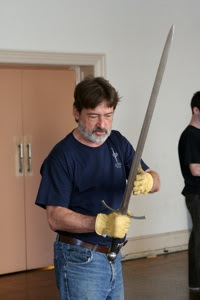Emerging as a Professional
by Philip Cuomo
The following is the final post of a 3-part series about how
an emerging theatre artist moves beyond their training into the professional
world. This was inspired by a conversation I facilitated with a group of
artists at Post5 Theatre as part of the first annual Outdoor Shakespeare Festival.
I finished my conservatory style theatre training in the 1980’s and with a few compatriots immediately formed a company: Oberon Theatre Ensemble. I spent three seasons working with Oberon and as a group we recognized that we were not developing as quickly as we wanted. I realize now that I was an impatient young man. But in looking for ways to improve, our company members branched out.
I met and worked with Robert Mooney, a teacher at ACT in San Francisco and a working theatre artist. I saw him perform Sir Toby Belch in New York City, one of many Sir Toby’s I have seen, and Robert was wonderful. His skill allowed him to be funny, mean and sympathetic all at once.
I enrolled in an audition workshop at the RiversideShakespeare Academy in New York that Robert taught. He created a list of ten possible audition pieces for me (that alone was worth the price of the class!). But the best bit of advice, or practice, he asked of the class - of me - was to identify people in the field I admire and want to work with. He challenged us to find ways to meet them, audition for them and eventually work with them. He made us create a list of 20.
 |
| Mark Lamos |
I introduced myself. He barely looked me in the eye as he shook my hand and moved away. The moment passed very quickly.
A year later I auditioned for him at Hartford Stage. They had an open call for a production of Romeo and Juliet and they needed Italian looking people. When I told him of our introduction he pretended to remember, and then he cast me as a supplemental extra. I was to be a background player.
It was an artist-defining production for me. I was surrounded by some of the best and most accomplished American theatre artists: Roberta Maxwell, Robert Stattel (who introduced me to Julie Taymor and helped me land an audition for her), Bill Camp, Calista Flockhart (before Ally McBeal) Chuck Conwell…the list was long.
Chuck was the fight choreographer and one of the reasons I was cast was for my physical ability and how well I moved. I was looking forward to the first fight call and getting a sword in my hand. But Chuck did not give me one.
 |
|
Charles
Conwell teaches broadsword for
Philadelphia
Stage Combat Workshop
|
He patted me on the back and said “Yeah, not everyone gets to carry a sword.”
Instead Chuck gave me a three-foot length of sausage. I was the sausage man. Chuck then choreographed a sprawling fight with 16 combatants. And as the sausage man, I beat the crap out of the three largest swordsmen with my three foot length of sausage.
I developed a simple and funny walk. During staging rehearsals I found opportunities to play around: slipping into a fountain, teasing the washer wenches, and getting tangled up in laundry. Then whenever Mark needed an added interesting dynamic to a scene or location he would call for the clown. “Get the clown out here,” he would say.
Before I knew it I was a clown. Bart Sher, who was the assistant director on the production, passed an essay from American Theatre to me about the commedia, other members of the artistic community suggested books to read and actors to watch. When I returned to New York I met and studied with David Shiner. I had seen David on Broadway in his Tony award-winning clown show with Bill Irwin called Fool Moon. David had made a name for himself in Cirque du Soleil. In fact he directed and created the last Cirque show here in Portland, KOOZA. After working with and learning from David for a couple of months, I never stopped working in the theatre again.
I was mentored by some of the best theatre artists in the country and they provided a path unique to my talents which helped define my artistry, my career or, as Sydney said some twenty plus years ago, my "lifestyle."

